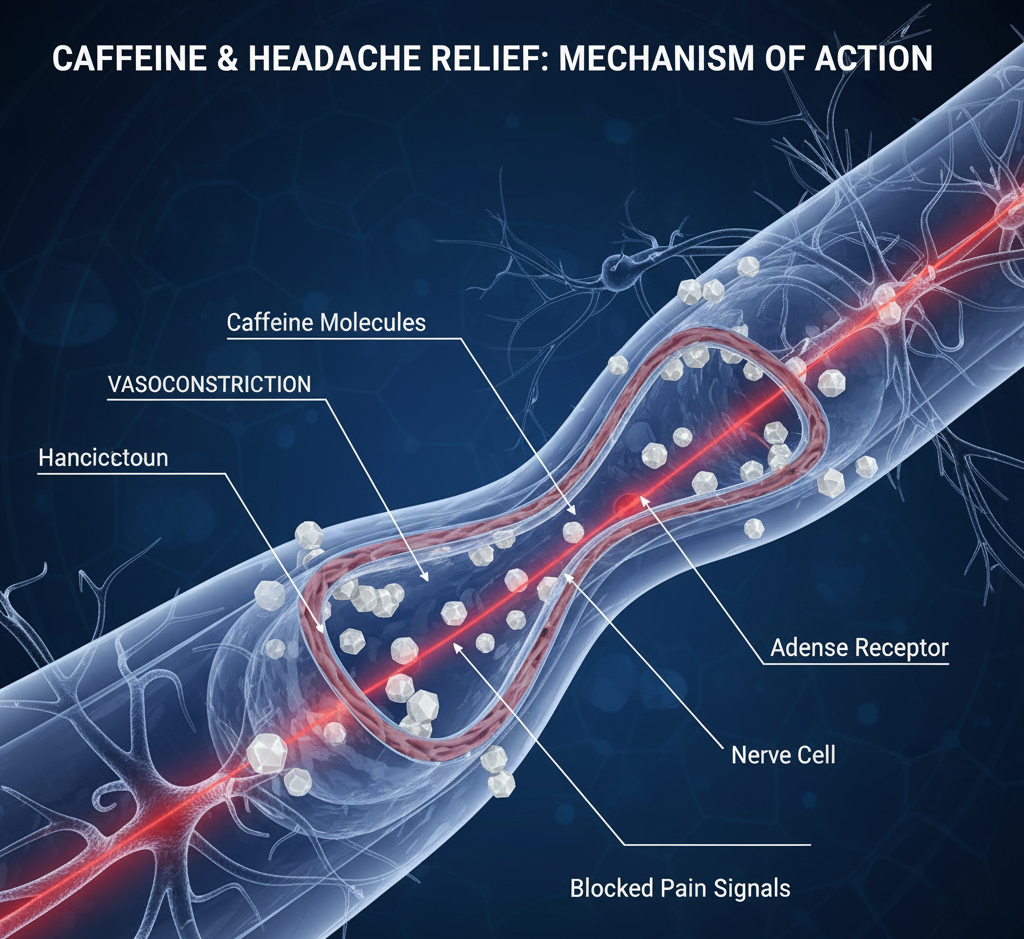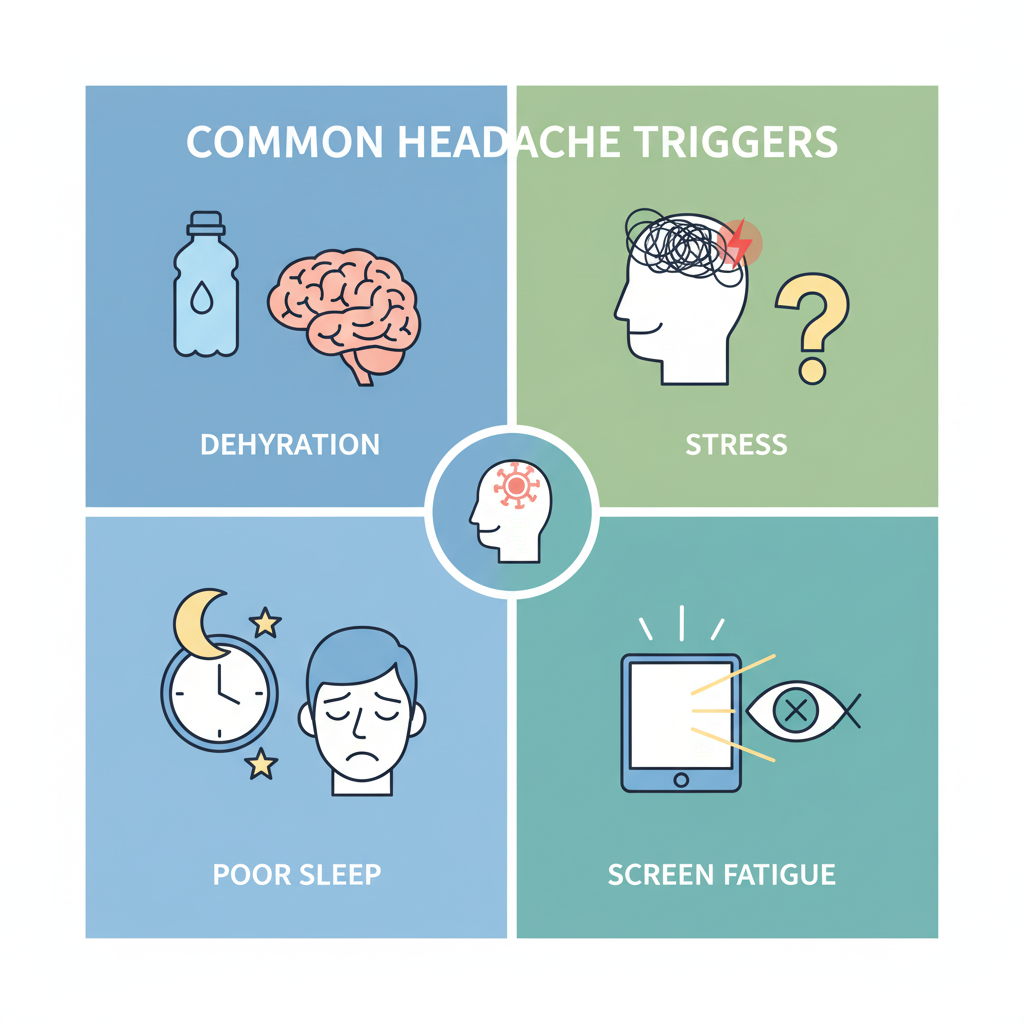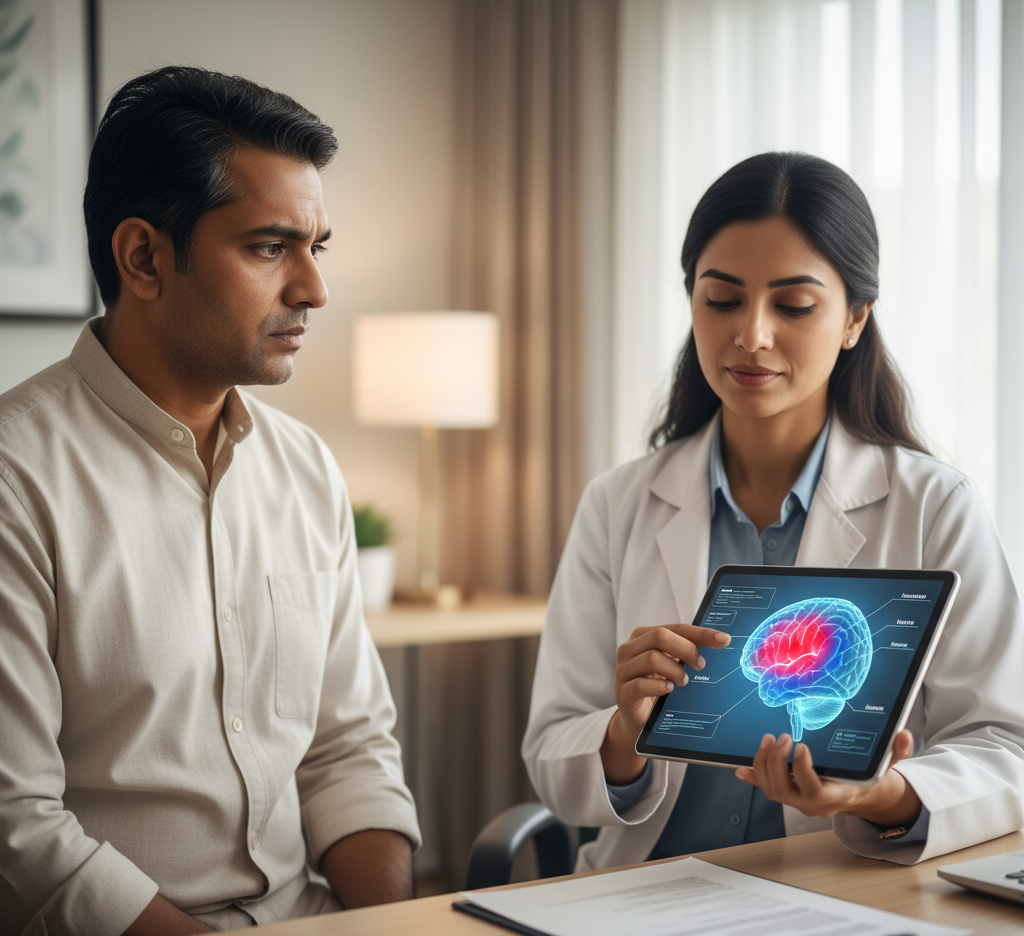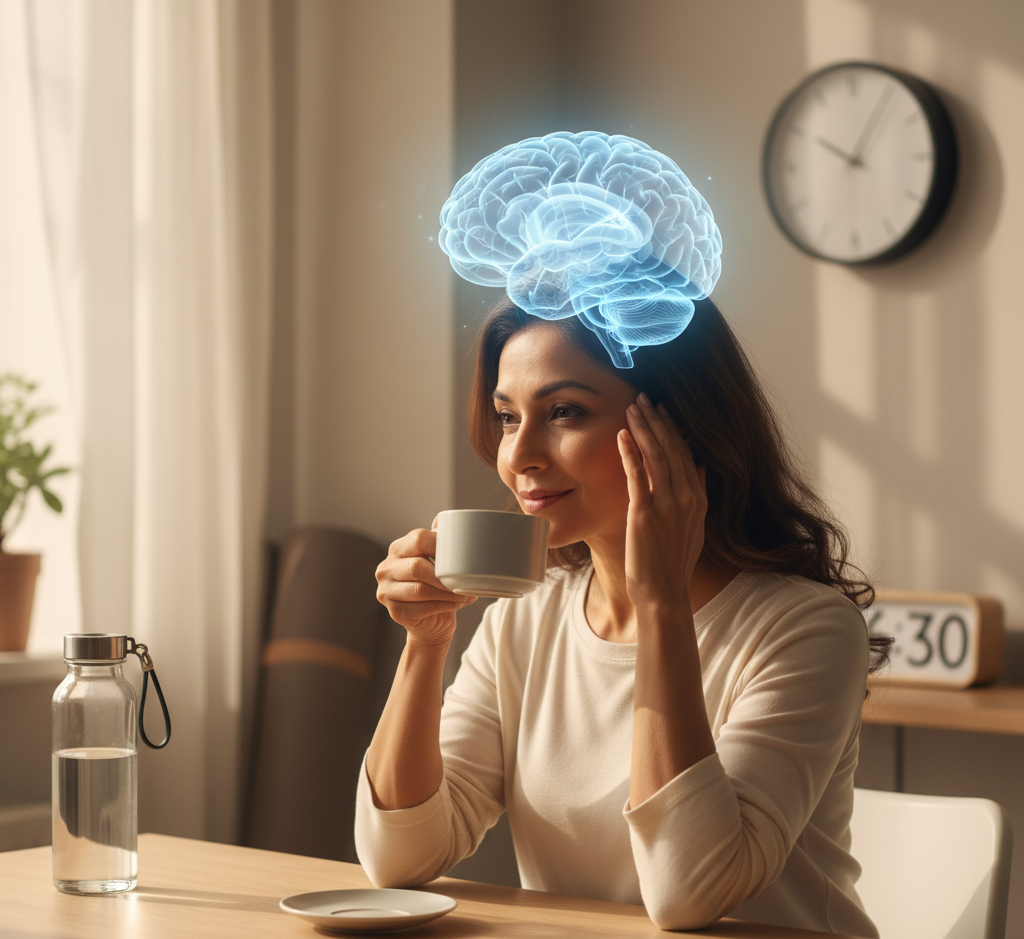Introduction: The Cup That Cures
Most of us reach for a cup of coffee to start the day, fight fatigue, or boost focus. But did you know that caffeine can actually help reduce headaches too? Studies show that caffeine can relieve mild to moderate headaches, especially when combined with over-the-counter pain relievers.
In India, where coffee and tea are part of daily life, understanding how caffeine affects the brain can help you use it as a simple, accessible way to ease discomfort. However, balance is key — too much caffeine can trigger the same problem it helps treat.
This blog explores how caffeine helps headaches, when it works best, and three other lifestyle tips for long-term headache management.
How Caffeine Helps Relieve Headaches
Caffeine affects the brain’s chemistry in several beneficial ways:
-
It constricts blood vessels — During headaches and migraines, blood vessels in the brain expand, causing pain. Caffeine reverses this dilation, providing relief.
-
It blocks pain signals — Caffeine blocks adenosine receptors in the brain, reducing the perception of pain.
-
It enhances medication effects — Painkillers like paracetamol or ibuprofen work better when combined with caffeine.
-
It boosts alertness — Caffeine can improve mood and focus, which often drop during headaches.
A moderate amount — about 50–200 mg (1 cup of coffee or 2 cups of tea) — is usually effective for headache relief.

Caffeine and Migraine Relief
Migraines are more than regular headaches — they are intense, often one-sided, and can include nausea, light sensitivity, or visual changes. Research shows that caffeine can shorten migraine duration if taken early.
However, it’s important to note:
-
Too much caffeine can trigger withdrawal headaches when stopped suddenly.
-
Consistency is key — stick to regular caffeine intake rather than fluctuating between excess and none.
-
Women may experience different effects due to hormonal variations influencing caffeine metabolism.
If you have chronic migraines, your doctor may guide how to safely use caffeine or combine it with prescribed medication.
The Science Behind Caffeine and Brain Function
Caffeine is a natural stimulant found in coffee, tea, cocoa, and energy drinks. It stimulates the central nervous system (CNS) by blocking adenosine — a neurotransmitter that causes drowsiness and dilates blood vessels.
When adenosine is blocked:
-
You feel more alert.
-
Blood flow in the brain stabilizes.
-
Pain perception decreases.
This mechanism is why caffeine is an ingredient in several headache medications — such as Excedrin, Anacin, and some Indian OTC pain-relief formulations.
When Caffeine Helps (and When It Hurts)
Caffeine can both treat and trigger headaches depending on how it’s used:
✅ Helps When:
-
Used in small to moderate doses (1–2 cups a day).
-
Taken at the first sign of a headache.
-
Consumed alongside pain-relief medicines.
⚠️ Hurts When:
-
Consumed in excess (3+ strong cups daily).
-
Suddenly stopped after regular use (withdrawal headache).
-
Used late at night, disrupting sleep.
The key is mindful consumption — enjoy caffeine as a tool, not a crutch.

Other Causes of Headaches You Should Know
While caffeine can help, understanding the root cause of your headache ensures better prevention. Common triggers include:
-
Dehydration — not drinking enough water, especially in hot Indian climates.
-
Skipping meals — low blood sugar can cause throbbing pain.
-
Stress — tension in the neck and shoulders often radiates to the head.
-
Poor sleep — irregular patterns or less than 6 hours of rest.
-
Eye strain — excessive screen time without breaks.
Three Other Natural Tips to Manage Headaches
1. Stay Hydrated
Dehydration is one of the most overlooked causes of headaches.
-
Drink 8–10 glasses of water daily.
-
Include fruits like watermelon, cucumber, and oranges.
-
Avoid excessive caffeine or alcohol, which can dehydrate you.
Hydration maintains blood flow and helps the brain function smoothly.
2. Get Regular, Restful Sleep
Your brain restores itself during sleep. Poor or irregular sleep raises cortisol (stress hormone) and lowers pain tolerance.
-
Maintain a fixed bedtime routine.
-
Limit caffeine after 4 p.m.
-
Avoid screens before bed.
Even small adjustments in your sleep schedule can reduce headache frequency.
3. Manage Stress with Relaxation Techniques
Tension headaches are common among working professionals and students.
-
Practice deep breathing or meditation for 10 minutes daily.
-
Try gentle yoga poses like Balasana (child’s pose) or Shavasana (corpse pose).
-
Listen to calm music or spend time outdoors.
Stress management reduces muscle tension, improves oxygen supply, and prevents chronic headaches.
Caffeine Withdrawal Headaches
If you suddenly stop caffeine after regular use, you might experience a withdrawal headache within 12–24 hours. Symptoms include tiredness, irritability, and difficulty concentrating.
To prevent this:
-
Reduce caffeine gradually.
-
Replace one coffee with herbal tea or lemon water.
-
Stay hydrated and get enough rest.
Most withdrawal symptoms subside within a few days.
ALSO READ: More Than A Hangover: Heavy Drinking Linked To Earlier And More Severe Strokes, Study Shows
Diet and Lifestyle Tips for Headache Prevention
-
Eat balanced meals on time.
-
Avoid excessive sugar and processed foods.
-
Maintain good posture while working.
-
Take short screen breaks every hour.
-
Get fresh air and moderate sunlight.
-
Keep your caffeine intake steady, not erratic.

When to See a Doctor
You should consult a general physician or neurologist if you experience:
-
Frequent or severe headaches lasting more than 3 days.
-
Visual disturbances or nausea with pain.
-
Headache after injury or physical exertion.
-
Dizziness, weakness, or slurred speech.
Early diagnosis can help identify underlying causes such as migraine, hypertension, or vision problems.
Caffeine and Headaches in Indian Context
In India, coffee culture is growing rapidly — from South Indian filter coffee to urban espresso bars. But tea remains the most common caffeine source. Moderate intake from these beverages (about 2–3 cups per day) can support mental clarity and headache relief.
However, instant coffee, energy drinks, and cola contain high caffeine levels that may cause rebound headaches. Always read labels and choose natural sources.
The Bottom Line
Caffeine can be a powerful ally in headache management — when used wisely. It narrows blood vessels, reduces pain sensitivity, and enhances alertness. Combined with proper sleep, hydration, and stress control, it can significantly reduce headache frequency.
But moderation is essential. Overuse can lead to dependency and rebound pain. Treat caffeine as part of a balanced, mindful lifestyle — not a quick fix.
If headaches persist, consult a doctor on Quickobook for accurate diagnosis and safe guidance.
Quickobook Call-to-Action
Book your consultation on Quickobook today to speak with neurologists, general physicians, or nutritionists who can help you manage recurring headaches safely.
Quickobook helps you book appointments, get online consultations, and access trusted healthcare experts — anytime, anywhere.
Visit www.quickobook.com — Your health, our priority.
50 FAQs: Caffeine, Headaches, and Brain Health
-
Can caffeine really help with headaches?
Yes, it constricts blood vessels and reduces pain perception. -
How much caffeine is safe per day?
Up to 200 mg (about 2 cups of coffee) is safe for most adults. -
Can caffeine trigger headaches?
Yes, excessive use or sudden withdrawal can cause headaches. -
Which drinks contain caffeine?
Coffee, tea, cola, energy drinks, and chocolate all contain caffeine. -
Is tea better than coffee for headaches?
Both can help, but tea contains less caffeine and is gentler on the stomach. -
Can caffeine cure migraines?
It can help reduce migraine pain if taken early in the attack. -
Does caffeine increase blood pressure?
Temporarily, yes — but moderate use is generally safe. -
Can caffeine cause dehydration?
Yes, in high amounts; always drink enough water alongside it. -
Is caffeine addictive?
Regular use can cause mild dependency, but not severe addiction. -
How can I avoid caffeine withdrawal headaches?
Cut down gradually rather than stopping suddenly. -
Can caffeine help with sinus headaches?
Yes, by reducing nasal swelling and improving blood flow. -
Does caffeine affect sleep?
Yes, avoid caffeine within 6 hours of bedtime. -
Can coffee cause stomach upset?
Yes, acidic coffee can irritate the stomach in sensitive people. -
What’s the best time to drink coffee for energy?
Morning or early afternoon, never too late in the day. -
Can I mix coffee with painkillers?
Some painkillers already contain caffeine; check labels before mixing. -
Is green tea effective for headaches?
Yes, it has mild caffeine and antioxidants that aid relaxation. -
Can caffeine relieve tension headaches?
Yes, by relaxing muscles and reducing stress. -
Does caffeine help during long work hours?
It boosts focus and concentration temporarily. -
Can pregnant women use caffeine for headaches?
Only in very small amounts; consult your doctor first. -
Is caffeine safe for children?
Children should avoid caffeine as it affects growth and sleep. -
How does caffeine improve blood circulation?
It temporarily constricts and then normalizes blood flow in the brain. -
Does caffeine interact with medicines?
Yes, it may interact with some drugs — check with your doctor. -
Can lack of caffeine cause headaches?
Yes, withdrawal headaches are common after skipping caffeine. -
How to know if my headache is from caffeine?
If pain occurs after skipping your usual coffee, it’s likely withdrawal. -
Can caffeine improve mood?
Yes, by stimulating dopamine and serotonin in the brain. -
Does caffeine help during travel headaches?
Yes, it improves alertness and reduces fatigue-related pain. -
What foods help with headaches?
Bananas, almonds, spinach, and magnesium-rich foods are helpful. -
Can exercise prevent headaches?
Yes, it increases oxygen supply and reduces tension. -
How much water should I drink daily?
At least 2–3 liters depending on climate and activity. -
Can yoga cure headaches?
Yoga improves posture and blood flow, preventing tension headaches. -
Is caffeine harmful for heart patients?
Moderation is essential; consult your cardiologist. -
Can caffeine replace sleep?
No, it only masks tiredness temporarily. -
Can I use cold compress with caffeine?
Yes, applying a cold pack enhances relief. -
Can skipping meals cause headaches?
Yes, low blood sugar triggers headaches; eat regular meals. -
How can I reduce stress headaches?
Practice relaxation, deep breathing, or take short breaks. -
Is caffeine-free coffee effective?
No, it lacks the vasoconstrictive effect that relieves headaches. -
Does caffeine affect women differently?
Yes, hormonal changes influence caffeine metabolism. -
Can caffeine reduce fatigue headaches?
Yes, by boosting alertness and energy. -
Should I stop caffeine completely?
Only if advised by your doctor for health reasons. -
Can cold drinks cause headaches?
Yes, especially chilled or carbonated beverages in sensitive people. -
Does caffeine cause anxiety?
In high doses, yes — it may increase jitteriness. -
Can I drink coffee with migraine medicine?
Check with your doctor; caffeine can enhance some drug effects. -
Are herbal teas good for headaches?
Yes, peppermint, chamomile, and ginger tea soothe pain naturally. -
Can I use caffeine during fasting?
Black coffee or plain tea is fine during intermittent fasting. -
Is caffeine bad for the liver?
Moderate coffee intake may actually support liver function. -
Can caffeine cause dizziness?
In high doses, yes, due to increased heart rate. -
Is caffeine found in chocolate?
Yes, dark chocolate has small amounts of caffeine. -
Can dehydration increase headache pain?
Absolutely, lack of water worsens brain pressure. -
Can quitting caffeine help sleep better?
Yes, many people sleep more deeply after reducing caffeine. -
How can I get personalized headache advice?
Book a consultation on Quickobook to speak with doctors who can guide you safely.









Comments (0)
No comments yet. Be the first to share your thoughts!
Leave a Comment